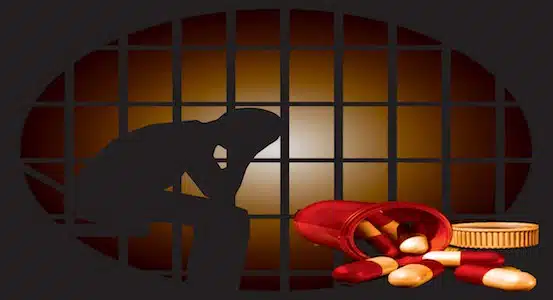New York City jails and prisons like Rikers Island, The Tombs, The Metropolitan Correctional Facility (federal), and Lincoln Correctional Facility all have something in common – a detainee population that includes individuals who have substance use disorders. A recent NYTimes article1 estimated that roughly 40% of the total U.S. prison population has a substance use disorder. In 2016, Jeremy Laintz, a heroin addicted individual in Colorado, was arrested while out on bond for failing to show up for a court-ordered drug test. While in prison, Laintz informed corrections officers that he suffered from Hepatitis C and that he was a regular heroin user. Despite going through intense withdrawal symptoms, the prison medical office prescribed only loperamide (for diarrhea) and meclizine (for nausea and vomiting). Two weeks after receiving little-to-no treatment, Laintz was placed in a medically induced coma and airlifted to the nearest hospital where he subsequently lost 6 toes to gangrene, lost part of his lung, and spent the next month in the hospital where he underwent multiple procedures2 . This is just one example of many jail medical deprivations leading to tragedies that could have been avoided with reasonable medical care. Earlier this year, the US Court of Appeals for the First Circuit in Boston ruled that an inmate was entitled to receive medication for their opioid use disorder after a lengthy court battle. The Pew Charitable Trusts estimates that fewer than 1% of US jails and prisons have allowed access to medication for the treatment of substance abuse disorders3 . This ruling helps to prevent health issues that arise while in prison due to withdrawal and the high prevalence of post-release overdose.
If you know someone who is currently incarcerated or is injured as a result of poor medical treatment while in jail or prison, please contact our office today. Giordano Law Offices Personal Injury & Employment Lawyers has successfully litigated on behalf of pretrial detainees and inmates who are deprived of basic human rights, including deprivations in medical care, wrongful death, medical malpractice, and other injuries in jail and prison settings. Our direct office line is 212-406-9466.
Sources:
Markey, Ed. (2018, May 30). Senator Markey Leads Bipartisan Call for Assessment of Drug Treatment Availability and Effectiveness in Correctional Facilities. Press Release on US Senate Website. Retrieved from URL: https://www.markey.senate.gov/news/press-releases/senator-markey-leads-bipartisan-c all-for-assessment-of-drug-treatment-availability-and-effectiveness-in-correctional-faciliti es
Coll, Steve. (2019, March 4). The Jail Healthcare Crisis. The New Yorker Magazine. Retrieved from URL: https://www.newyorker.com/magazine/2019/03/04/the-jail-health-care-crisis
Doyle, Kevin. (2019, June 10). Appeals Court’s Smart Move Paves the way for Opioid Addiction Treatment in Prisons and Jails. Stat News. Retrieved from URL: https://www.statnews.com/2019/06/10/opioid-addiction-treatment-correctional-facilities/
Goodnough, Abby. (2019, March 15). Methodone Helped Her To Quit Heroin. Now She is Suing U.S. Prisons to Allow the Treatment. The New York Times. R etrieved from URL: https://www.nytimes.com/2019/03/15/health/methadone-prisons-opioids.html
Vestal, Christine. (2018, April 4). New Momentum for Addiction Treatment Behind Bars. Pew Trusts Organization. Retrieved from URL: https://www.pewtrusts.org/en/research-and-analysis/blogs/stateline/2018/04/04/new-mo mentum-for-addiction-treatment-behind-bars
Related Posts
- What To Do If Your Loved One Died In Jail or Prison
Giordano Law Offices Personal Injury & Employment Lawyers has handled several high-profile wrongful death cases…
- First Responders And Delivery Personnel During COVID-19: No Charge For Wills, Healthcare Proxies, And Powers Of Attorney
Giordano Law Offices Personal Injury & Employment Lawyers is proud to provide wills, powers of…


